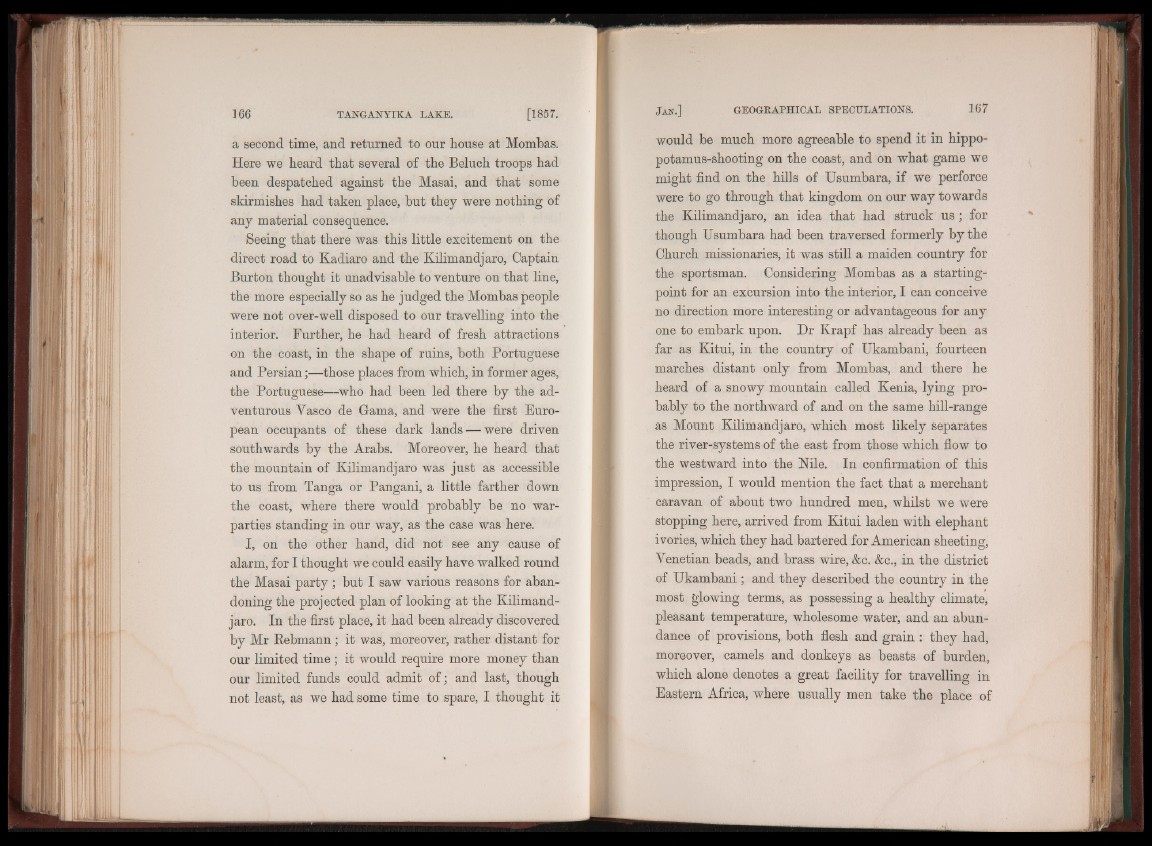
a second time, and returned to our house at Mombas.
Here we heard that several of the Beluch troops had
been despatched against the Masai, and that some
skirmishes had taken place, but they were nothing of
any material consequence.
Seeing that there was this little excitement on the
direct road to Kadiaro and the Kilimandjaro, Captain
Burton thought it unadvisable to venture on that line,
the more especially so as he judged the Mombas people
were not over-well disposed to our travelling into the
interior. Further, he had heard of fresh attractions
on the coast, in the shape of ruins, both Portuguese
and Persian ;—those places from which, in former ages,
the Portuguese—who had been led there by the adventurous
Vasco de Gama, and were the first European
occupants of these dark lands — were driven
southwards by the Arabs. Moreover, he heard that
the mountain of Kilimandjaro was just as accessible
to us from Tanga or Pangani, a little farther down
the coast, where there would probably be no war-
parties standing in our way, as the case was here.
I, on the other hand, did not see any cause of
alarm, for I thought we could easily have walked round
the Masai party ; but I saw various reasons for abandoning
the projected plan of looking at the Kilimandjaro.
In the first place, it had been already discovered
by Mr Eebmann ; it was, moreover, rather distant for
our limited time ; it would require more money than
our limited funds could admit of ; and last, though
not least, as we had some time to spare, I thought it
would be much more agreeable to spend it in hippopotamus
shooting on the coast, and on what game we
might find on the hills of Usumbara, if we perforce
were to go through that kingdom on our way towards
the Kilimandjaro, an idea that had struck u s ; for
though Usumbara had been traversed formerly by the
Church missionaries, it was still a maiden country for
the sportsman. Considering Mombas as a starting-
point for an excursion into the interior, I can conceive
no direction more interesting or advantageous for any
one to embark upon. Dr Krapf has already been as
far as Kitui, in the country of Ukambani, fourteen
marches distant only from Mombas, and there he
heard of a snowy mountain called Kenia, lying probably
to the northward of and on the same hill-range
as Mount Kilimandjaro, which most likely separates
the river-systems of the east from those which flow to
the westward into the Nile. In confirmation of this
impression, I would mention the fact that a merchant
caravan of about two hundred men, whilst we were
stopping here, arrived from Kitui laden with elephant
ivories, which they had bartered for American sheeting,
Venetian beads, and brass wire, &c. &c., in the district
of Ukambani; and they described the country in the
most glowing terms, as possessing a healthy climate,
pleasant temperature, wholesome water, and an abundance
of provisions, both flesh and grain : they had,
moreover, camels and donkeys as beasts of burden,
which alone denotes a great facility for travelling in
Eastern Africa, where usually men take the place of